Most of the international world has condemned Russian President Vladimir Putin for invading Ukraine. As explained by Professor John Mearsheimer, American political scientist and international relations scholar, the conventional wisdom in the West—the United States and its allies—is that Putin is responsible for this crisis. While on the surface level this is quite apparent, the truth of the reality is that Putin was provoked by the West to invade Ukraine.
Since 2008, the US-backed West has sought to turn Ukraine into a Western bulwark on Russia’s border. And that policy, according to Mearsheimer, had three dimensions to it:
- NATO expansion eastward;
- EU expansion;
- Colour Revolution (in Ukraine Orange Revolution) with the idea to convert Ukraine into a liberal democracy that would be almost exclusively modelled on the US.
We must keep in mind that in 1999, the former Soviet-satellite countries of Poland, Hungary, and the Czech Republic joined NATO; Romania and the Baltic States did the same in 2004—there are now thirty nations in the Alliance.
In April 2008, during the NATO-Bucharest Summit, NATO announced that Georgia and Ukraine would definitely become part of its alliance, which became the straw that broke the camel’s back for Putin—he was not going to allow the West to expand to his doorstep.
Putin, therefore, sent Russian troops to invade Georgia, a small, democratic, former Soviet Republic in the Caucuses. Russia then essentially annexed two small parts of Georgia, South Ossetia and Abkhazia by encouraging them to declare “independence” and then coming to their protection.
On 22 February 2014, during what is known as the Maidan Revolution, Putin decided to invade and take over Crimea from Ukraine, subsequently fomenting a civil war in Russian-speaking areas of eastern part of the country that has cost over 14,000 lives.
Why did this happen? It did because of an American-sponsored coup that overthrew the corrupt and pro-Russian leader, Viktor Yanukovych, and installed a pro-US one, Oleksandr Valentynovych Turchynov—in 2019, Yanukovych was sentenced in absentia to thirteen years’ imprisonment for high treason by a Ukrainian court. This coerced the Russians to take Crimea from the Ukrainians, especially since there was an important naval base at Sevastopol, which Putin did not want NATO to occupy.
Ukraine has had a partnership with NATO since 1992. NATO established a Ukraine-NATO Commission in 1997, providing a discussion forum for security concerns and as a way to further the NATO-Ukraine relationship—without a formal membership agreement. In 2017, Ukraine adopted a constitutional amendment that committed itself to NATO membership. Kyiv then adopted a National Security Strategy in 2021 with the goal to further develop its NATO partnership. Under the pretext to protect the Russian-populated Donetsk and Luhansk as independent republics, Putin decided to invade Ukraine in order to prevent a US-led NATO take-over of his backyard.
Sanctions Will Not Get The Job Done
Over the last five years, Russia has supplied around 40 per cent of all natural gas in Europe
The West has now imposed sanctions on Russian entities and individuals, including high ranking government officials, senior military, and especially the oligarch class, as well as banks. However, they have stopped short of banning the Russians from the SWIFT payment system. The hope is that Putin will curtail his eventual takeover of Ukraine. However, sanctions are not going to get the job done because of Europe’s dependency on a solid 40 per cent of Russian exports of oil, gas, and grain. In fact, over the last five years, Russia has supplied around 40 per cent of all natural gas in Europe. Some countries are more exposed than others, with Italy being the most vulnerable, since 50 per cent of its electricity comes from natural gas and 95 per cent of that amount is imported.
The immediate result of the invasion, according to JP Morgan, was a downward spiral in the US stock market. Specifically,
- the S&P 500 went down 1.7 per cent;
- European stocks dropped 4 per cent–5 per cent;
- Russian stocks were down 35 per cent, while the rouble plummeted and then rebounded when the Russian central bank announced interventions;
- European spot market natural gas prices rose from $28 per MMBtu to $39 per MMBtu (compared to $4.8 in the US, which we discuss below);
- corn and wheat prices are limit up (Ukraine accounts for 10 per cent–15 per cent of global grain exports).
Given these moves, the next global PMI reading could drop from 54 to the mid 40s, which would be contractionary territory.
Another point is that President Putin will, in a tit-for-tat, eventually cut off natural resources to those Western countries that have imposed sanctions on the Russian Federation. Let us also not forget that China, although a reluctant ally of Putin, will not go against Moscow.
Those who put the blame exclusively on Putin, fail to comprehend the historical determinants that compelled him to take such action
The invasion of Ukraine as a free and sovereign nation can in no way be justified. However, the fact that most Westerners, or for that matter, most of the member states of the United Nations, put the blame exclusively on Putin for the war in Ukraine, indicates that they fail to comprehend the historical determinants that compelled him to take such action. Putin has accused the Biden administration (and previous ones as well) of violating the Monroe Doctrine, which stated that the United States would not interfere in European wars. With Ukraine, Putin is also emulating the other principle of the Monroe Doctrine, according to which an intervention in the political affairs of the Americas by foreign powers would be considered a hostile act against the US.
Adolf Hitler’s main grievance after World War I was the defeat and humiliation of Germany. In like manner, Vladimir Putin has harboured antipathy for the peaceful dissolution of the Soviet Union in 1991, which he infamously called ‘the greatest geopolitical catastrophe of the [twentieth] century.’ And the former KGB colonel has now found a reason to try and rebuild the former Soviet empire at any cost.
Putin’s full invasion of Ukraine has put the West on its back foot, where it is now struggling to find ways to deter Moscow’s aggressive acts. Regrettably, numerous innocent civilians have died and have been displaced. Under just war theory, which is rooted in natural law, Ukrainians have a right and a duty to defend their homeland. At the same time, there is a reality to be faced: no matter how much military supplies the Ukrainians receive from NATO member states, no foreign country, at this point at least, is going to send a single soldier to fight on Ukrainian soil. And Putin, who is totally opposed to democracy, will not relent, especially since he knows he is up against an impotent West.








